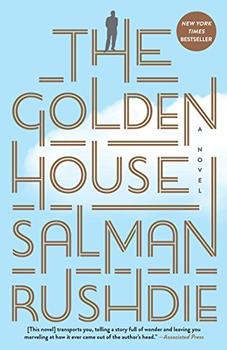Summary | Excerpt | Reading Guide | Reviews | Beyond the Book | Readalikes | Genres & Themes | Author Bio

A Novel
by Salman Rushdie1
On the day of the new president's inauguration, when we worried that he might be murdered as he walked hand in hand with his exceptional wife among the cheering crowds, and when so many of us were close to economic ruin in the aftermath of the bursting of the mortgage bubble, and when Isis was still an Egyptian mother-goddess, an uncrowned seventy-something king from a faraway country arrived in New York City with his three motherless sons to take possession of the palace of his exile, behaving as if nothing was wrong with the country or the world or his own story. He began to rule over his neighborhood like a benevolent emperor, although in spite of his charming smile and his skill at playing his 1745 Guadagnini violin he exuded a heavy, cheap odor, the unmistakable smell of crass, despotic danger, the kind of scent that warned us, look out for this guy, because he could order your execution at any moment, if you're wearing a displeasing shirt, for example, or if he wants to sleep with your wife. The next eight years, the years of the forty-fourth president, were also the years of the increasingly erratic and alarming reign over us of the man who called himself Nero Golden, who wasn't really a king, and at the end of whose time there was a large—and, metaphorically speaking, apocalyptic—fire.
The old man was short, one might even say squat, and wore his hair, which was still mostly dark in spite of his advanced years, slicked back to accentuate his devil's peak. His eyes were black and piercing, but what people noticed first—he often rolled his shirtsleeves up to make sure they did notice—were his forearms, as thick and strong as a wrestler's, ending in large, dangerous hands bearing chunky gold rings studded with emeralds. Few people ever heard him raise his voice, yet we were in no doubt that there lurked in him a great vocal force which one would do well not to provoke. He dressed expensively but there was a loud, animal quality to him which made one think of the Beast of folktale, uneasy in human finery. All of us who were his neighbors were more than a little scared of him, though he made huge, clumsy efforts to be sociable and neighborly, waving his cane at us wildly, and insisting at inconvenient times that people come over for cocktails. He leaned forward when standing or walking, as if struggling constantly against a strong wind only he could feel, bent a little from the waist, but not too much. This was a powerful man; no, more than that—a man deeply in love with the idea of himself as powerful. The purpose of the cane seemed more decorative and expressive than functional. When he walked in the Gardens he gave every impression of trying to be our friend. Frequently he stretched out a hand to pat our dogs or ruffle our children's hair. But children and dogs recoiled from his touch. Sometimes, watching him, I thought of Dr. Frankenstein's monster, a simulacrum of the human that entirely failed to express any true humanity. His skin was brown leather and his smile glittered with golden fillings. His was a raucous and not entirely civil presence, but he was immensely rich and so, of course, he was accepted; but, in our downtown community of artists, musicians and writers, not, on the whole, popular.
We should have guessed that a man who took the name of the last of the Julio-Claudian monarchs of Rome and then installed himself in a domus aurea was publicly acknowledging his own madness, wrongdoing, megalomania, and forthcoming doom, and also laughing in the face of all that; that such a man was flinging down a glove at the feet of destiny and snapping his fingers under Death's approaching nose, crying, "Yes! Compare me, if you will, to that monster who doused Christians in oil and set them alight to provide illumination in his garden at night! Who played the lyre while Rome burned (there actually weren't any fiddles back then)! Yes: I christen myself Nero, of Caesar's house, last of that bloody line, and make of it what you will. Me, I just like the name." He was dangling his wickedness under our noses, reveling in it, challenging us to see it, contemptuous of our powers of comprehension, convinced of his ability easily to defeat anyone who rose against him.
Excerpted from The Golden House by Salman Rushdie. Copyright © 2017 by Salman Rushdie. Excerpted by permission of Random House. All rights reserved. No part of this excerpt may be reproduced or reprinted without permission in writing from the publisher.
The third-rate mind is only happy when it is thinking with the majority. The second-rate mind is only happy when it...
Click Here to find out who said this, as well as discovering other famous literary quotes!
Your guide toexceptional books
BookBrowse seeks out and recommends the best in contemporary fiction and nonfiction—books that not only engage and entertain but also deepen our understanding of ourselves and the world around us.